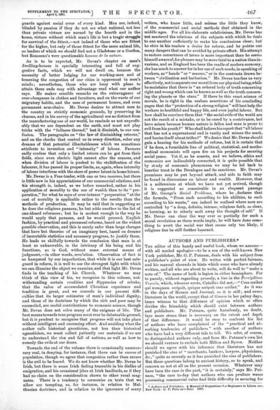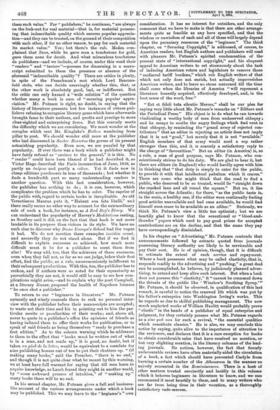AUTHORS AND PUBLISHERS.* THE editor of this handy and useful
book, whom we assume— with all needed apologies—to be a son of the well-known New York publisher, Mr. G. P. Putnam, deals with his subject from a publisher's paint of view. He writes with perfect fairness, and his manual abounds in hints which some who have already written, and all who are about to write, will do well to "make a note of." The name of both is legion in either hemisphere. For to parody, without regarding prosody, a line in the Pervigi2ium Veneris, which, whoever wrote, Catullas did not,—" Cras scribet qui nanqua,m scripsit, quique scripsit eras scribet." As it was in the days of Horace and Juvenal, so it is still ; and every literature in the world, except that of Greece in her palmy days, bears witness to that difference of opinion which so often divides the friendship which should exist between authors and publishers. Mr. Putnam, quite harmlessly, no doubt, lays more stress than is necessary on the extent and depth of that difference. It would be easy to confront his list of authors who have complained of the "practical and ab- sorbing tendencies of publishers" with another of authors who have bad a very different tale to tell. We refer, of course, to distinguished authors only, and from Mr. Putnam's own list we should venture to exclude both Milton and Byron. Neither should we agree with his inference that literature has not punished the sins of "merchants, bankers, lawyers, physicians, Src.," quite as severely as it has punished the sins of publishers. But these questions belong to ancient history, so to speak, and concern us not at all on the present occasion. Whatever may have been the case in the past, "it is certainly," says Mr. Put- nam, "the case to-day that authors who can produce wares possessing commercial value find little difficulty in securing for
• Authors and Publisher,. A Manual of Suggestions Lg. Beginners in Liters ure. New York: G. P. Pittnim's Sons. 1883.
them such value." For "publishers," he continues, "are always on the look-out for real material—that is, for material possess- ing that indescribable quality which secures popular apprecia- tion—and they can be trusted, on the ground of their competition with each other, if for no other reason, to pay for such material its market value." Yes; but there's the rub. Medea com- plained that Zeus, while he gave men a touchstone for gold, gave them none for deceit. And what miraculous touchstone do publishers—and we include, of course, under this word their "readers" and "tasters "—possess for discerning in a manu- script submitted to them the presence or absence of the aforesaid "indescribable quality"? There are critics in plenty, in spite of the Frenchman's mot which. Lord Beacons- field stole, who can decide unerringly whether this, that, or the other work is absolutely good, bad, or indifferent. Bat the critic can only hazard a "wide solution" of the question whether many a book is sure of "securing popular appre- ciation." Mr. Putnam is right, no doubt, in saying that the history of literature presents but few instances of obtuse pub- lishers refusing to recognise literary gems which have afterwards brought fame to their authors, and profits and prestige to more clear-sighted and enterprising firms. But this scarcely meets the difficulty which we are considering. We must wonder at the scruples which sent Mr. Kinglake's Eothen wandering from pillar to post. We should wonder still more- at the publisher who had discovered in Ballo). Resartus the germs of its present astonishing popularity. Even now, we are puzzled by that popularity. If ever there was a book which a publisher might have fairly refused as "caviare to the general," it is this. No " reader " could have been blamed if he had described it, as Victor Hugo described the Paris insurrection of June, 1848, as partly an enigme and partly a colere. Yet it finds now in cheap editions purchasers in tens of thousands ; but whether it finds a hundredth part so many understanding readers is another question. With this last consideration, however, the publisher has nothing to do ; it is one, however, which .complicates the problem which he has to solve. The caprice of the public witkregard to certain books is inexplicable. As old Terentianns Manses puts it, "Habent sua feta, libelli," and there really seems no other way to account for the extraordinary sale of such a book, for instance, as A Bad Boy's Diary. We can understand the popularity of Hervey's Meditations resting, as Southey said it did, on the fact that that book is not more laudable in its purpose than vicious in its style. We have no such clue to discover why Dame Europa's School had the vogue it had. We do not mention these examples invidice caned., and assuredly they do not stand alone. But if we find it difficult to explain successes so achieved, how much more difficult must it be for a publisher to scent them from afar ! We may add, too, that the achievers of these successes, even when they fall not, so far as we can judge, below their first effort, find the public, as a rule, unceremoniously indifferent to their subsequent productions. With this, too, the publisher has to reckon, and if authors were as noted for their equanimity as proverbially they are not, it would still be easy to see how com- plications might arise,—and to explain why the poet Campbell, at a literary dinner, proposed the health of Napoleon because "he once shot a publisher."
To return to our "beginners in literature." Mr. Putnam earnestly and wisely counsels them to seek no personal inter- view with the publisher before their manuscripts are accepted; to waste not their time and his in pointing out to him the par- ticular merits or peculiarities of their works; and, above all, never to quote in a publisher's office the opinions of friends as having induced them to offer their works for publication, or to speak of said friends as being themselves "ready to purchase a first edition." As to the solemn warning which he addresses to them to the effect that "books must be written out of what is in a man, and not made up," it is good, no doubt, but if taken au pied de la lettre, would be equivalent to a mandate for nine publishing houses out of ten to put their shutters up. "Of making many books," said the Preacher, "there is no end," and though it is not quite clear what he meant by this warning, we at least have full warrant for saying that till men learn to acquire knowledge, as Lamb feared they might in another world, by "some awkward process of intuition," of "making up" many books there will be no end.
In his second chapter, Mr. Putnam gives a full and business- like account of the various arrangements under which a book may be published. This we may leave to the " beginner's " own consideration. It has no interest for outsiders, and the only comment that we have to make is that there are other arrange- ments quite as feasible as any here specified, and that the wisdom or unwisdom of each and all of these willlargely depend upon the pecuniary resources of the "beginner." The third chapter, on "Securing Copyright," is addressed, of course, to American readers, but English authors and publishers will read with pleasure Mr. Putnam's spirited condemnation of the present state of "international copyright," and his eloquent appeal to American writers to set strenuously about the task of inducing American voters and legislators to remove those " media:mai tariff burdens," which rob English writers of that which not only does not enrich, but actually impoverishes American writers, and to leave no stone unturned till the time shall come when the libraries of America "will represent a literature honestly acquired, effectively developed, and, in the best sense of the word, free."
" Est et fideli tuta silentio Merces," shall be our plea for saying very little about Mr. Putnam's remarks on "Editors and the Periodical Press." His object is to do what he can towards vindicating a worthy body of men from undeserved obloquy ; and he essays to soothe the angry feelings which find vent in that obloquy, by reminding the "grand army of rejected con- tributors" that an editor in rejecting an article does not imply that it is not "good," but merely that it is not " English Members of that army would need a sop rather stronger than this, and it is scarcely a satisfactory reply to the charge of "favouritism." But an editor (in America) is, as a rule, a man of good purpose, says Mr. Putnam, who con- scientiously strives to do his duty. We are glad to hear it, but there are editors (in England) who would hardly agree with him in thinking that "that duty is simply to cater for the public, to provide it with that intellectual pabulum which it craves." There are some who might think that the road to find a public, who deserved to be so treated, would lie "straight down the creoked lane and all round the square." But no, it lies straight across the Atlantic ; for there, "as the public taste is, in the main, a healthy one, if the editor were continually finding good articles unavailable and bad ones available, he would find himself soon cease to be available as an editor." Seriously, we think Mr. Putnam's view a little too optimist ; but we are heartily glad to know that the sensational or " blood-and- thunder " papers which used to pay good prices for accepted contributions are on the decline, and that the sums they pay have correspondingly diminished.
In his chapter on "Advertising," Mr. Putnam contends that announcements followed by extracts quoted from journals possessing literary authority are likely to be serviceable and pay their cost. He is of opinion, though, that it is difficult to estimate the extent of such service and repayment. Where a book possesses what may be called elasticity, that is, responds readily to the advertising and "pushing," a great deal can be accomplished, -he believes, by judiciously planned adver- tising, to extend and keep alive such interest. But when a book does not possess this "elasticity," it "cannot be crammed down the throats of the public like Winslow's Soothing Syrup.'" Mr. Putnam, it should be observed, in qualification of this last remark, is careful to notice the renewed life which was put by his father's enterprise into Washington Irving's works. This he regards as due to skilful publishing management. The now much neglected works of William Hazlitt would probably prove "elastic" in the hands of a publisher of equal enterprise and judgment, for they certainly possess what Mr. Putnam regards as a sine qua non for such a revival, "the essential qualities which constitute classics." He is also, we may conclude this notice by saying, quite alive to the importance of attention to the reviewers, and declares that it is a rare exception for books to obtain considerable sales that have received no mention, or but very slighting mention, in the literary columns of the lead- ing journals. He notices, however, the fact that fiercely unfavoarable reviews have often materially aided the circulation of a book, a fact which should have prevented Carlyle from burning a certain number of the Athenceuin in the manner so naively recounted in the Reminiscences. There is a host of other matters treated succinctly and lucidly in this volume which it behoves beginners in literature to know, and we can. recommend it most heartily to them, and to many writers who are far from being tiros in their vocation, as a thoroughly satisfactory vade-mecnm.















































 Previous page
Previous page